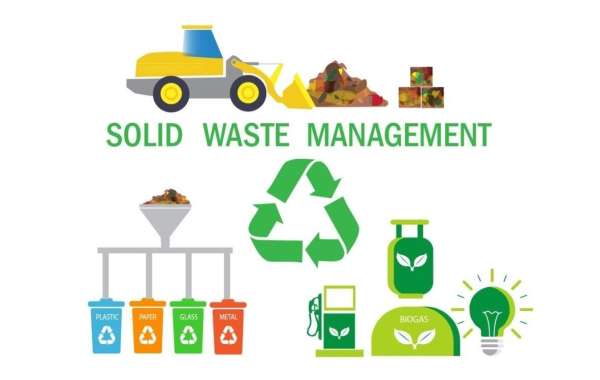Waste management is an issue that affects us all, whether we realize it or not. The way we handle and dispose of solid waste has a profound impact on our environment, public health, and quality of life. In recent years, there has been a growing awareness of the need for efficient waste solutions to tackle the challenges of solid waste management. This article will explore the importance of efficient waste solutions and how we can master solid waste management for a more sustainable future.
Understanding the Solid Waste Problem
Solid waste, often referred to as trash or garbage, encompasses a wide range of materials, including household waste, industrial waste, construction debris, and more. The problem of solid waste is not limited to any specific region; it is a global challenge that every community faces. Improper disposal of solid waste can lead to environmental degradation, health hazards, and economic burdens.
One of the most pressing issues is the growth in waste generation. As populations increase and consumerism rises, the amount of solid waste produced continues to surge. This trend puts immense pressure on our landfills, incinerators, and recycling facilities. The mismanagement of solid waste not only depletes natural resources but also contributes to greenhouse gas emissions, pollution, and the degradation of ecosystems.
The Need for Efficient Waste Solutions
Efficient waste solutions are essential to address the complex and multifaceted problem of solid waste management. They aim to minimize waste generation, improve waste collection and transportation, and promote recycling and resource recovery. Efficient waste solutions also encourage public participation and awareness, fostering a culture of responsible waste disposal.
Here are some key reasons why efficient waste solutions are crucial:
Environmental Preservation: Proper waste management reduces the environmental impact of solid waste. By minimizing waste generation and promoting recycling, we can conserve natural resources and reduce pollution.
Public Health: Inadequate waste management can lead to the spread of diseases and health hazards. Efficient solutions prioritize safe and hygienic disposal practices, protecting the health of communities.
Resource Conservation: Many items in our waste stream still contain valuable resources. Recycling and recovery programs can salvage materials like metals, plastics, and paper, reducing the need for raw material extraction.
Economic Benefits: Efficient waste solutions can save money in the long run. Reduced waste generation and disposal costs, along with income generated from recycling, can benefit both governments and businesses.
Climate Change Mitigation: Landfills and incineration facilities produce greenhouse gases. Reducing waste and promoting sustainable practices can help mitigate climate change.
Mastering Solid Waste Management
To master solid waste management and implement efficient waste solutions, we need a multi-pronged approach. Here are some strategies that can help us achieve this goal:
Reduce and Reuse: The first step in efficient waste management is to reduce waste generation. This can be achieved through conscious consumption, product design that minimizes packaging, and the promotion of reusable items. Encouraging consumers to buy only what they need and to repair or repurpose items can make a significant difference.
Recycling Programs: Communities should establish comprehensive recycling programs that accept a wide range of materials. These programs should be easily accessible to residents and businesses. Education and awareness campaigns can help citizens understand what can and cannot be recycled.
Composting: Organic waste makes up a significant portion of our solid waste stream. Composting can turn this waste into valuable soil conditioner. Municipalities should promote and support composting initiatives, including curbside collection and community composting centers.
Waste-to-Energy Technologies: Incineration with energy recovery can be a viable option for managing non-recyclable waste. These technologies can generate electricity from waste while reducing its volume. However, strict emissions controls are necessary to minimize air pollution.
Landfill Management: When landfill disposal is unavoidable, it should be done responsibly. Modern landfills are designed to minimize environmental impact, with liners to prevent groundwater contamination and systems to collect and treat methane emissions.
Waste Collection and Transportation: Efficient waste solutions require well-organized collection and transportation systems. Municipalities should invest in the proper equipment and logistics to ensure that waste is collected and transported in a timely and environmentally friendly manner.
Legislation and Regulation: Governments play a crucial role in regulating waste management practices. They can establish laws and regulations that promote responsible waste disposal, impose fines for illegal dumping, and set targets for recycling and waste reduction.
Public Education: Raising awareness among the public is key to the success of efficient waste solutions. Community outreach and education programs can help citizens understand the importance of waste management and how they can contribute to the effort.
Collaboration: Solid waste management is a complex issue that requires collaboration between governments, businesses, and communities. Partnerships can lead to innovative solutions and efficient waste management practices.
The Role of Technology
Technology plays a significant role in improving solid waste management. Advanced waste sorting and processing technologies can enhance recycling rates and reduce the amount of waste sent to landfills. Additionally, smart waste collection systems that use sensors and data analytics can optimize routes and schedules, making waste collection more efficient.
Conclusion
Efficient waste solutions are not just about managing trash; they are about creating a more sustainable and healthy future for our planet. By mastering solid waste management through responsible consumption, recycling, and responsible disposal, we can reduce our environmental footprint, protect public health, conserve resources, and mitigate climate change. It's a collective effort that requires the involvement of governments, businesses, and individuals. The benefits of efficient waste solutions are clear, and it's time for us to take action to address the solid waste challenges of our time.







